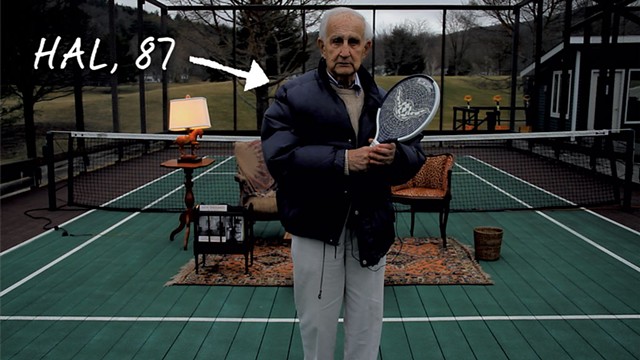
- Courtesy Of Camille Thoman
- Hal De Bona in The Longest Game
Camille Thoman had no idea what fate had in store for her when her mother suggested they play a game of platform tennis. The Los Angeles-based filmmaker, who was visiting her mother in southern Vermont, didn't even know how the game was played when she arrived at the Dorset Field Club. But there she encountered the "one o'clock players," a group of men in their seventies and eighties whose daily matches would form the basis for Thoman's documentary The Longest Game.
"Within minutes, they had me charmed to an extent that I rarely have the opportunity to feel in my life," Thoman recalls in a phone interview from LA.
The Longest Game will have its broadcast premiere on Vermont PBS on Thursday, May 3, as part of the network's "Made Here" series. Thoman notes that the film was originally intended to be a three- or four-minute short. When she and producer Elizabeth Yng-Wong arrived in Dorset to begin shooting, the project quickly morphed into a feature filmed over several years.
"As soon as I got there, I realized this film is not just going to be about paddle tennis, this film is not just going to be about the one o'clock players; it's going to be about the passage of time and the ways in which human beings connect," Thoman says.
Platform tennis — commonly called paddle tennis, despite a similar sport having the same name — is like regular doubles tennis, except only one serve is allowed per point, and balls can be played off a chicken-wire screen surrounding the court. The playing surface is raised off the ground and heated from beneath, making this the sole racket sport that can be played outdoors when it's snowing.
For the Dorset paddle players, the game is more about camaraderie than heated competition. It also serves as a good way to stay active during the cold-weather months. As octogenarian David Bumgardner quips in the film, "Winters in Vermont can be like 10 pounds of ham for two people — it's forever."
The Longest Game is Thoman's first documentary. A former solo performance artist on the London stage, she directed the 2017 psychological thriller Never Here, featuring the late Sam Shepard in his final film performance.
The doc takes an intimate approach: The filmmakers interact casually with the players in their homes, and Yng-Wong appears frequently on camera, sometimes with audio recording equipment in hand. Thoman observes that she eschewed fly-on-the-wall techniques primarily because of Yng-Wong's rapport with the older players.
"As it developed, I noticed that often the most beautiful thing in the room was a conversation or an exchange happening between Elizabeth and Maurie [Warner]," Thoman says. "And I thought, Why wouldn't I film something this dynamic? So she kind of became a part of the film organically."
Another element of the film that developed naturally was the incorporation of home movies shot on Super 8 film over several decades by Hal De Bona, who won back-to-back Dorset Field Club platform tennis championships in 1971 and '72. De Bona, who died in 2016 at the age of 92, offered the footage unsolicited to Thoman. In a poignant interview, he regrets that even as he was preserving those memories for posterity, he wasn't as present in the moment as he should have been.

- Courtesy Of Camille Thoman
- Camille Thoman
"Did I really understand and grasp, at that moment, how precious that moment was, as I should have?" De Bona reflects. "I wasn't a grouch, I smiled, but I was a participant ... I took things for granted."
A seemingly incongruous element of the film is the subject of volcanoes, which crops up in several unrelated conversations. When one interviewee randomly mentions Edward Bulwer-Lytton's 1834 novel The Last Days of Pompeii, about the eruption of Mount Vesuvius, Thoman comments from behind the camera, "This feels like it could be as relevant as anything, and I can't put my finger on why." Not until Yng-Wong told her that volcanoes represent change in the ancient Chinese divination text the I Ching, she says, did Thoman recognize the significance of the motif and its link to the aging process.
"Aging is all about forces of change, movement [and] transformation. The transformation of one thing into another thing," Yng-Wong states in the film. "So volcanoes are a really beautiful, visceral example of that kind of transformation, because in the process of the lava flowing towards the water, actual new earth is created."
The film's final spotlight belongs to De Bona, who spontaneously launches into Emily Webb's famous monologue from the Thornton Wilder play Our Town, about the tendency of humans to overlook the subtle beauties of everyday life. Thoman says that, while her documentary focuses on a very specific group of people in a small town in Vermont, she thinks it addresses universal concerns about aging and mortality.
"I think human beings think of themselves as very different from one another ... but, at the core, we're more alike than we are different, and we're all on very similar journeys," Thoman says. "This film isn't just about these old men. It's really about all of us, together, on the wheel of life."









Comments
Comments are closed.
From 2014-2020, Seven Days allowed readers to comment on all stories posted on our website. While we've appreciated the suggestions and insights, right now Seven Days is prioritizing our core mission — producing high-quality, responsible local journalism — over moderating online debates between readers.
To criticize, correct or praise our reporting, please send us a letter to the editor or send us a tip. We’ll check it out and report the results.
Online comments may return when we have better tech tools for managing them. Thanks for reading.